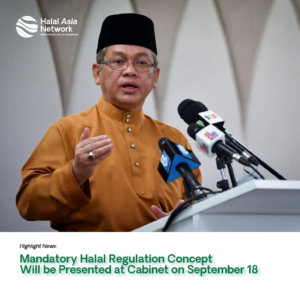Malaysia's Minister in the Prime Minister’s Department has drafted a draft proposal for mandatory halal certification, which it presented to the cabinet in mid-September. Dato’ Dr. Mohd Na'im Mokhtar, Minister in the Prime Minister’s Department in charge of Religious Affairs, argues that the proposal for mandatory halal certification may lengthen the process, as halal certification is now voluntary. The goal of changing the certification procedure is to address concerns raised by the Muslim community about the adherence of items to halal principles, as there are currently numerous products and services accessible, as well as the growth of e-commerce both domestically and internationally.
The suggestion will be discussed further in Parliament and across government bodies. The Islamic Development Department Malaysia (Jakim) will also participate in the discussion process, along with other stakeholders who may be affected by this new policy. Some stakeholders who were immediately impacted by the ruling included business associations, restaurant operators, and other relevant parties. With the involvement of numerous related stakeholders, it is expected that the policy will be clearly communicated to all stakeholders and that all stakeholders will be able to express their concerns, thereby reducing the possibility of adverse policy effects, particularly on the private sector and consumers.
Dr. Mokhtar also explained that once the cabinet approves the full analysis, he will develop a proposal for submission. Following this, a paper will be presented to the Muzarakah Committee of the National Council for Islamic Religious Affairs (MKI). MKI is one of Malaysia's central Islamic authorities, and it can decide if required halal certification should be introduced in Malaysia. Regarding these technical procedures, Prime Minister Anwar Ibrahim directed the related minister to prepare a complete report supporting the Mandatory Halal Certification policy proposal.
Assessment
Malaysia will implement a new mandatory halal policy for most food and beverage products. Amid the myriad new versions of food and beverage products, the Muslim community of Malaysia has expressed worry about producers' adherence to halal principles based on Islamic values. The policy change process must be preceded by extensive research that includes not only halal and Islamic principles but also the legislative and institutional framework and the workforce required to implement the new policy. To execute the new policy, the government must ensure that all articles of the new rule do not impose an unreasonable burden on producers and the private sector. In terms of institutions, there must be clear roles and duties for which institutions have a role in assessing the halal adherence of a product, particularly for companies located far from the center of government and commerce operations outside of the capital. The institutional structure will also influence how many people will be involved in this new policy, whether they will use existing personnel or hire new ones. Finally, Malaysia's government may learn from other Muslim countries, particularly Indonesia, which is geographically close to Malaysia and shares a similar culture.

